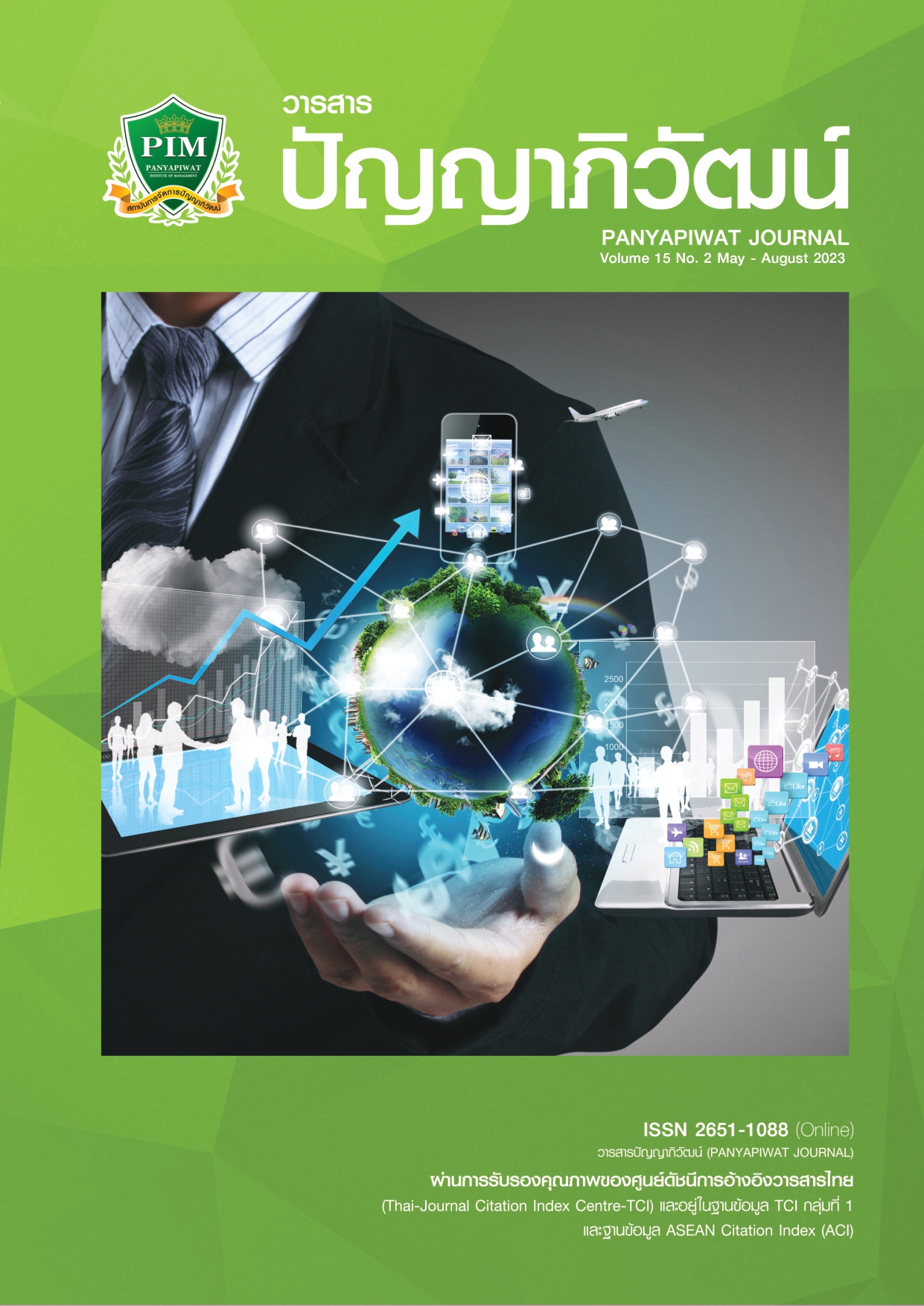มโนทัศน์ความเป็นครูในปรัชญาขงจื่อและพุทธศาสนา
Main Article Content
บทคัดย่อ
บทความวิจัยนี้มีวัตถุประสงค์เพื่อ 1) ศึกษามโนทัศน์ความเป็นครูในปรัชญาขงจื่อ 2) ศึกษามโนทัศน์ ความเป็นครูในพุทธศาสนา และ 3) วิเคราะห์และเปรียบเทียบมโนทัศน์ความเป็นครูในปรัชญาขงจื่อและพุทธศาสนา โดยศึกษาข้อมูลจากคัมภีร์หลุนอี้ว์ฉบับภาษาไทยควบคู่กับฉบับภาษาจีน ศึกษาหนังสือพุทธธรรม ฉบับปรับปรุงและขยายความ และวิเคราะห์ข้อมูลด้วยวิธีวิเคราะห์เชื่อมโยงเนื้อหา ผลการวิจัยพบว่า 1) มโนทัศน์ ความเป็นครูในปรัชญาขงจื่อ แบ่งออกเป็น 6 ประการ โดยใช้ความรักเป็นรากฐานในการสั่งสอนและดูแลศิษย์ มุ่งปลูกฝังคุณธรรมแก่ศิษย์ และพึงรู้จักเรียนรู้อยู่เสมอ 2) มโนทัศน์ความเป็นครูในพุทธศาสนา แบ่งออกเป็น 6 ประการ โดยมีหลักกัลยาณมิตรธรรม 7 เป็นหลักธรรมสําคัญที่กล่าวถึงการเป็นครูได้ชัดเจนที่สุด และ 3) ประเด็นเปรียบเทียบพบว่า ทั้งปรัชญาขงจื่อและพุทธศาสนาต่างเชื่อว่าครูเป็นบุคคลสําคัญที่คอยฝึกฝนศิษย์ให้เกิดปัญญา ส่วนมโนทัศน์ที่แตกต่างกัน ได้แก่ การบ่มเพาะศิษย์ให้บรรลุเป้าหมายการดํารงชีวิตตามอัตถะ 3 ทั้งสองแนวคิด มีเป้าหมายในการบ่มเพาะศิษย์ให้บรรลุในระดับต้นและระดับกลางเหมือนกัน แต่ในปรัชญาขงจื่อไม่พบคําสอน ที่กล่าวถึงการบ่มเพาะศิษย์ให้บรรลุประโยชน์ระดับสูง คือ การสอนให้รู้แจ้งถึงสภาวธรรมของสิ่งทั้งหลายและการเข้าถึงสภาวะนิพพาน
Article Details

อนุญาตภายใต้เงื่อนไข Creative Commons Attribution-NonCommercial-NoDerivatives 4.0 International License.
“ข้าพเจ้าและผู้เขียนร่วม (ถ้ามี) ขอรับรองว่า บทความที่เสนอมานี้ยังไม่เคยได้รับการตีพิมพ์และไม่ได้อยู่ระหว่างกระบวนการพิจารณาลงตีพิมพ์ในวารสารหรือแหล่งเผยแพร่อื่นใด ข้าพเจ้าและผู้เขียนร่วมยอมรับหลักเกณฑ์การพิจารณาต้นฉบับ ทั้งยินยอมให้กองบรรณาธิการมีสิทธิ์พิจารณาและตรวจแก้ต้นฉบับได้ตามที่เห็นสมควร พร้อมนี้ขอมอบลิขสิทธิ์บทความที่ได้รับการตีพิมพ์ให้แก่สถาบันการจัดการปัญญาภิวัฒน์หากมีการฟ้องร้องเรื่องการละเมิดลิขสิทธิ์เกี่ยวกับภาพ กราฟ ข้อความส่วนใดส่วนหนึ่งและ/หรือข้อคิดเห็นที่ปรากฏในบทความข้าพเจ้าและผู้เขียนร่วมยินยอมรับผิดชอบแต่เพียงฝ่ายเดียว”
เอกสารอ้างอิง
Bhikkhu, B. (2004). Dhamma for Teachers narrated by Bhuddhadasa Bhikkhu at Mokkhaplaram Religion Practice Garden, Chaiya District, Surat Thani Province on 4-29 September 2004.
Chalakbang, W. (2016). The spirituality of teachers: A key characteristic of professional teachers.
Nakhon Phanom University Journal, 6(2), 123-128. [in Thai]
Chen, R. (2016). The confucian thought of "teaching and learning mutual benefit" and the professional development of contemporary teachers. Journal of Educational Institute of Jilin Province, 10, 11-12. [in Chinese]
Kong, Q. (2010). The moral embedding of confucianism in teacher education in China. Journal of Teaching and Management, 14, 13-14. [in Chinese]
Li, Z. (2004). Reading the analects today (3rd ed.). Longchang Weiye Printing Limited Company Press. [in Chinese]
Natchamnong, T., & Limpanusom, P. (2008). Confucius philosophy: The pedagogy of confucius. Baiboau Books. [in Thai]
Panyaprasoetkul, K., Thanaphaet, C., Pisaisarakhun, P., & Saypakhom, I. (2020). Teacher training according to Buddhist principles. NEU Academic and Research Journal, 10(2), 176-187.
Phra Brahmagunabhorn (PA. Payutto). (2009). Buddhadhamma (Revised and expanded edition) (11th ed.). Mahachulalongkornrajavidyalaya Press. [in Thai]
Phrakru Kowitsutaporn (Somdee Kowito). (2017). The Role of Teacher in Theravada Buddhism and Hinduism. Journal of MCU Studies Special Issue, 5(sp1), 126-139. [in Thai]
Royal Academy. (2011). The royal institute dictionary 2011: The edition to commemorate King Bhumibol Adulyadej's seventh cycle (84th) birthday anniversary in 5 December 2011. Sirivatana Interprint Public Company Limited.
Satha-Anand, S. (2019). Lun Yu: The sayings of confucius. Openbooks Publishing. [in Thai]
Sreechanhod, K. (2014). A study of Sevenfold Kalanamitta-dhamma in Tipitaka for teachers. Mahachulalongkornrajavidyalaya University. [in Thai]
Sukhawandee, B., & Pookonglee, S. (2020). The ideal life as conceived in Theravada Buddhism. RTNA Journal of Social Sciences, Humanities and Education, 7(1), 31-42. [in Thai]
Tongsuk, A. (2009). Lun Yu: The analects of confucius (The analects of ancient China) (2nd ed.). Chunhawat. [in Thai]
Trueplookpanya. (2023, February 28). Prakunteesam Song by Trueplookpanya. https://www.trueplookpanya.com/truelittlemonk/season5/video/798_
Yao, S. (2019). The enlightenment of confucian thought on benevolence and rites on the cultivation of teacher ethics in primary and secondary schools in the new era. Young Society, 24(2), 82-83. [in Chinese]


